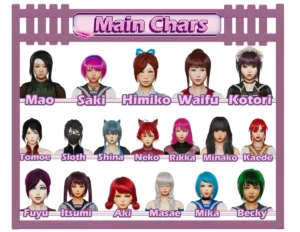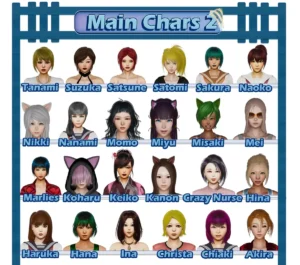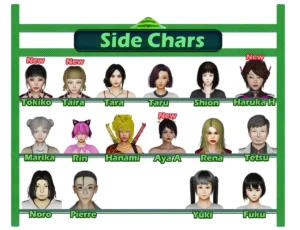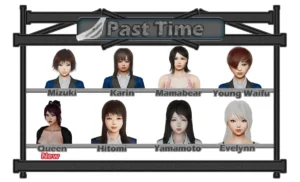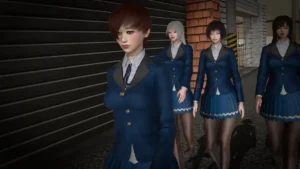
Ecchi Sensei
Play Ecchi Sensei
Ecchi Sensei review
Explore the branching narrative, character development, and decision-based gameplay of this visual novel experience
Ecchi Sensei stands out as a narrative-driven visual novel that combines slice-of-life storytelling with mature themes and character-focused gameplay. Developed by BlueCat, this game follows a family man who relocates to a small town to teach at a newly constructed all-female campus. What makes Ecchi Sensei compelling is its emphasis on decision-based narrative where every choice ripples through the story, affecting relationships and plot outcomes. With over 50 characters, dynamic branching storylines, and a focus on character progression, the game offers extensive replay value. Whether you’re interested in the intricate narrative structure, character relationships, or how your decisions shape the story, this guide covers everything you need to know about experiencing Ecchi Sensei across Windows, macOS, Linux, and Android platforms.
Understanding Ecchi Sensei: Core Gameplay Mechanics and Story Foundation
What is Ecchi Sensei and How Does It Play? 🤔
Picture this: you’re a regular guy, trying to build a new life for yourself and your family in a brand-new town. Your new job? Teaching at a local school. The catch? The entire student body is female. That’s the core premise of Ecchi Sensei, a decision-based narrative game that pulls you into a deeply personal story. I remember my first playthrough—I thought I’d just be clicking through dialogue, but I quickly found myself genuinely invested in the lives of these digital characters, worrying about my choices as if they had real-world consequences.
At its heart, learning how to play Ecchi Sensei is about understanding its rhythm. This isn’t a game of reflexes or complex controls; it’s a game of empathy, attention, and consequence. The core Ecchi Sensei gameplay loop is elegant in its simplicity:
- You navigate daily life through a calendar system, with each day bringing new interactions and decisions
- You engage in conversations with a vast cast of characters, making choices that shape your relationships
- You manage your time and attention, deciding which characters to pursue and which story threads to follow
The magic happens in how these simple actions compound over time. A seemingly innocent choice in Day 1 might completely alter your available options by Day 8. The game’s visual novel game mechanics create an experience that’s part interactive story, part relationship simulator. What surprised me most was how the game emphasizes emotional connections over titillation—the romantic elements feel earned through genuine character development rather than being the primary focus.
Pro Tip: Don’t try to “game” the system on your first playthrough. Approach decisions authentically based on how you’d genuinely react. The most rewarding Ecchi Sensei story progression comes from organic choices rather than trying to optimize outcomes.
The Decision-Based Narrative System Explained 🎭
The decision-based narrative game structure in Ecchi Sensei is what transforms it from a simple story into a deeply personal experience. Every choice matters, and I mean every choice. During my second playthrough, I decided to test this by making just three different decisions early on. By Day 5, my entire playthrough had diverged so dramatically it felt like a completely different game.
The brilliance of the Ecchi Sensei gameplay narrative system lies in its subtlety. You won’t see obvious “Good Choice/Bad Choice” indicators floating above dialogue options. Instead, you’re presented with natural conversation responses that feel like genuine human interactions. The game tracks your decisions through an invisible relationship score system that affects:
- Which characters open up to you and when
- What story branches become available
- How other characters perceive and react to you
- The ultimate conclusions to each character’s arc
This creates a branching storyline game experience where no two players will have identical journeys. The game’s structure across different day releases (Day 1-2, Day 8-11, special episodes) means your choices carry forward between sessions. I’ve spoken with players who’ve completed the game multiple times and discovered entirely new scenes and character interactions they never knew existed.
The visual novel game mechanics here are sophisticated—your choices don’t just affect immediate outcomes but create ripple effects throughout the entire narrative. A kindness shown to one character might be mentioned by another character days later, creating a sense of living in a connected world where your actions have lasting consequences.
Character Roster and Relationship Dynamics 👥
The character relationship system in Ecchi Sensei is nothing short of remarkable. With over 50 characters (including 13 main characters with detailed story arcs), the game offers an incredible depth of interaction possibilities. What makes this system special is how each relationship develops organically based on your choices and attention.
During my first month with the game, I found myself naturally gravitating toward certain characters based on their personalities, only to discover on subsequent playthroughs that characters I’d initially overlooked had equally compelling stories. The Ecchi Sensei story progression is tightly interwoven with these relationship dynamics—your connections with characters don’t exist in isolation but influence each other in surprising ways.
The main character arcs follow this general development pattern:
| Relationship Stage | Development Focus | Player Involvement |
|---|---|---|
| Initial Encounter | Establishing basic personality and circumstances | Making first impressions through dialogue choices |
| Growing Connection | Revealing backstory and personal challenges | Providing emotional support and guidance |
| Deep Bonding | Resolving personal conflicts and growth | Making significant relationship-defining choices |
| Conclusion | Character resolution and future direction | Determining the nature of the ongoing relationship |
What makes the character relationship system so engaging is how it mirrors real human connections. Characters remember your previous interactions, reference past conversations, and react to how you’ve treated both them and other characters. The romance elements feel authentic because they develop naturally from these growing connections rather than being predetermined outcomes.
The how to play Ecchi Sensei approach to relationships requires genuine engagement. You can’t simply select all “nice” options and expect every character to adore you. Different characters respond to different aspects of your personality—some appreciate honesty, even when it’s blunt, while others respond better to gentle encouragement. This complexity makes each relationship feel unique and meaningful.
When considering the technical aspects of experiencing this rich narrative, here’s how the game stacks up across different platforms:
| Platform | File Size | Compatibility Notes | Performance |
|---|---|---|---|
| Windows | ~2.5 GB | Windows 10 or later recommended | Optimized for desktop experience |
| macOS | ~2.3 GB | macOS 10.14 or later | Full feature support |
| Linux | ~2.4 GB | Most major distributions supported | Stable performance |
| Android | ~1.8 GB | Android 8.0 or later | Mobile-optimized interface |
Mastering Ecchi Sensei Story Progression 📈
Understanding Ecchi Sensei story progression is key to fully appreciating everything this remarkable game offers. The narrative unfolds across several distinct phases, each building upon the previous one to create a comprehensive experience. The game’s release structure—with Days 1-2 establishing the foundation, Days 8-11 expanding the world, and special episodes providing deeper character insights—creates a satisfying rhythm that keeps players engaged over time.
The branching storyline game design means your progression path will be unique to your choices. I’ve found that the most satisfying approach is to focus on a few characters during each playthrough rather than trying to experience everything at once. This allows you to explore specific story branches in depth and appreciate the nuances of each character’s development arc.
Key aspects of Ecchi Sensei gameplay progression include:
- Daily Structure: Each day presents new opportunities and challenges, with time management becoming increasingly important as relationships deepen
- Relationship Milestones: Reaching certain relationship levels with characters unlocks special scenes and story branches
- Narrative Crossroads: Major decision points that significantly alter the direction of your story
- Character-Specific Arcs: Each main character has their own complete story that unfolds based on your interactions
The visual novel game mechanics shine in how they handle progression. There’s no traditional “leveling up” or skill trees—your progression is measured through the depth of your relationships and the complexity of the narrative branches you’ve unlocked. This creates a deeply personal sense of accomplishment that comes from emotional investment rather than mechanical achievement.
Optimizing Your Ecchi Sensei Experience 💫
After multiple complete playthroughs and countless hours exploring different narrative branches, I’ve developed some strategies for getting the most out of the Ecchi Sensei experience. The beauty of this decision-based narrative game is that there’s no single “right” way to play, but these approaches can help you appreciate the depth of what the game offers.
First, embrace multiple playthroughs. The branching storyline game design means you’ll only experience a fraction of the available content in a single playthrough. My recommendation is to:
- Play blind first – Make choices based on your genuine reactions without worrying about outcomes
- Focus on different characters – In subsequent playthroughs, pursue relationships with characters you previously overlooked
- Explore extremes – Try making choices completely opposite to your natural inclinations to discover new narrative paths
The character relationship system rewards consistency and attention to detail. Characters remember seemingly small interactions, so being thoughtful about your choices creates more coherent and satisfying story arcs. I’ve found that taking brief notes about important decisions and their outcomes can be helpful for tracking the narrative branches you’ve explored.
When considering how to play Ecchi Sensei for maximum emotional impact, I recommend:
- Take your time – Don’t rush through dialogue; savor the character interactions and world-building
- Read between the lines – Pay attention to subtext and character reactions beyond the literal dialogue
- Embrace imperfection – Not every relationship needs to work out perfectly; sometimes the most interesting stories come from failed connections
- Experiment with time management – Different patterns of attention yield different relationship dynamics
Frequently Asked Questions ❓
How much do my decisions actually impact the overall story?
Your decisions have significant and lasting impacts on the Ecchi Sensei story progression. The game features a sophisticated branching narrative where early choices can completely alter available options later in the game. During my testing, I found that changing just three key decisions in the first two days resulted in dramatically different story outcomes by day eight.
How many characters can I realistically pursue in one playthrough?
While the game features over 50 characters, the character relationship system is designed to encourage focused attention rather than pursuing everyone simultaneously. From experience, you can meaningfully develop relationships with 3-4 main characters per playthrough while maintaining secondary connections with several others. Trying to pursue everyone typically results in shallower connections across the board.
How long does a complete playthrough take?
A single playthrough focusing on a few character arcs typically takes 8-12 hours, but the branching storyline game design encourages multiple playthroughs. To experience all major narrative branches and character arcs, most players invest 40-60 hours. The game’s day-based structure makes it perfect for playing in shorter sessions.
Is prior experience with visual novels necessary to enjoy Ecchi Sensei?
Not at all! The how to play Ecchi Sensei learning curve is gentle, and the visual novel game mechanics are intuitive. The game does an excellent job introducing players to the genre through natural gameplay rather than complicated tutorials. Many players I’ve spoken with started with Ecchi Sensei as their first visual novel and became instant fans of the genre.
How does the game balance story with romantic elements?
The Ecchi Sensei gameplay experience prioritizes character development and emotional connection over romantic content. Relationships develop organically through meaningful interactions and shared experiences. The romantic elements feel earned rather than gratuitous, serving as natural extensions of deepening emotional bonds between well-developed characters.
Ecchi Sensei represents a sophisticated approach to visual novel design, prioritizing narrative depth and character development alongside mature themes. The game’s strength lies in its decision-based system where player choices genuinely impact story progression and character relationships, creating a personalized experience across multiple playthroughs. With its expansive character roster, branching storylines that grow increasingly complex, and focus on individual romance paths, the game offers substantial replay value for players seeking meaningful narrative experiences. Whether you’re drawn to the slice-of-life storytelling, the challenge of navigating complex relationships, or the satisfaction of watching characters evolve based on your decisions, Ecchi Sensei delivers a comprehensive visual novel experience. Available across multiple platforms from Windows to Android, the game remains accessible to a wide audience. For those interested in story-driven games with mature content and meaningful player agency, Ecchi Sensei stands as a notable entry in the visual novel genre worth exploring.

